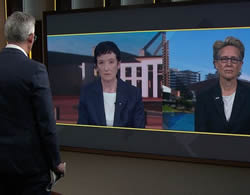Angela Priestley* says a recent interview has highlighted the benefits of women in top jobs.
 Something peculiar happened on the ABC on Sunday morning. Two women leading organisations representing the interests of two very different and typically conflicting areas, appeared together in a debate-style interview.
Something peculiar happened on the ABC on Sunday morning. Two women leading organisations representing the interests of two very different and typically conflicting areas, appeared together in a debate-style interview.
There were things they disagreed on, but they demonstrated respect, highlighted the fact they had participated in constructive conversations, and seemed to go out of their way to continually share what they agreed on.
The audience was left thinking that just maybe, these two influential women with significantly more power working together than working against each other, had been talking.
Perhaps they had even been collaborating on a couple of things.
And the audience wouldn’t be wrong.
The first leader was Jennifer Westacott AO, Chief Executive of the Business Council of Australia.
The second was Sally McManus, Secretary of the Australian Council of Trade unions.
Not your typical brunch buddies.
But two of the most powerful people in the country.
On Sunday morning, the ACTU and BCA announced intentions to revive “key principles” of an enterprising deal that gained momentum two years back — which was dropped following industry backlash.
As for their appearance on Sunday morning’s Insiders, it was an informative segment that highlighted areas where the ACTU and BCA agree on, as well as where they don’t.
They answered questions respectfully and seemingly authentically.
They played their part in participating in an actual interview.
Where was the political point scoring? Where were the angry rebuttals?
Where were the refusals to answer the questions, as Barnaby Joyce had done in a spectacular way during the same interview segment one week earlier?
These things were lost to instead focus on sharing substance, as well as possibilities.
Together, Westacott and McManus shared a type of leadership and conciliation that we haven’t seen much of lately.
They’re unlikely to be best friends, but it seems they have some respect for each other, and an understanding of the interests the other represents.
Their work and collaboration will be essential this week at the National Jobs and Skills Summit.
Australia is at a crisis point when it comes to accessing the necessary pool of skills we need to move forward.
That’s especially true across the caring sector, areas that are dominated by women and have been severely undervalued and underpaid for far too long.
Four of the top ten most “in demand” jobs of the next five years are related to care: early childhood teachers, child care workers, nurses and aged and disability carers.
Sure, we also need more software engineers and even more chefs.
But nobody interested in the future of Australia can ignore the fact that we depend on the caring economy.
And that caring economy is fracturing, fast.
As I wrote last week, when we consider just how in demand those in care fields are, we must also consider the high rates of burnout and intentions to leave that are being recorded from those within them.
In nursing, a massive three quarters of nurses declared an intention to leave over the next two to five years.
Similar figures were reported for early childhood education workers back in 2021, with 73 per cent of educators declaring plans to leave within three years.
We know that an increase in immigration will help.
But so too will upskilling and reorganising our existing workforce to be able to fill the gaps.
And so too will protecting and valuing those working in sectors that have been undervalued and underpaid for too long – sectors that were the frontline of Australia long before the pandemic set in.
The jobs crisis is one that is solvable, and in everyone’s interests to do so.
It needs imagination – not an overwhelming amount, just more than what we’ve been served over the past decade.
But ultimately this crisis needs collaboration.
Westacott and McManus appear to have demonstrated they are not only doing some of that, but are willing to continue.
*Angela Priestley is the Founding Editor of Women’s Agenda, and now heads up the publication’s parent company Agenda Media.
This article first appeared at womensagenda.com.au.





